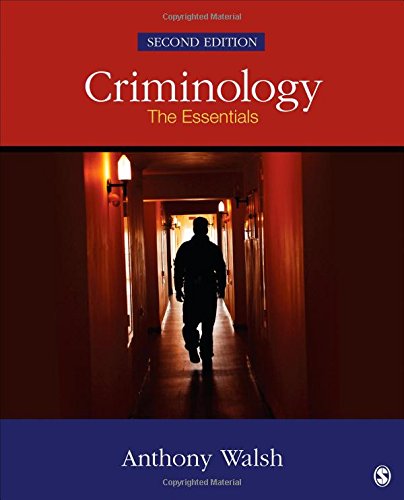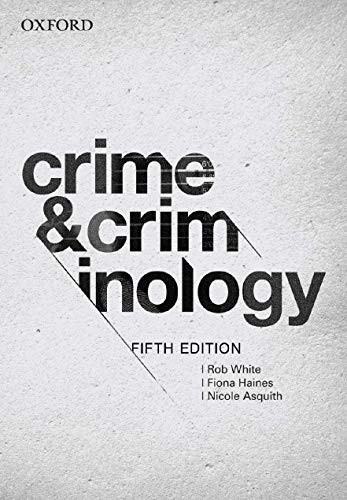What are
/r/Criminology's
favorite Products & Services?
From 3.5 billion Reddit comments
The most popular Products mentioned in /r/Criminology:
The most popular Services mentioned in /r/Criminology:
PSPP
Worldcat
Ask
The most popular reviews in /r/Criminology:
I've used Criminological Theory: Past to Present for nearly every course I've taken. It translates well across the entire field and covers the fundamentals but also delves into some of the deeper theories, especially the different schools of thought and how they translate into a more modern society. I don't think I would have survived grad school without it.
Crime and Criminology. White Asquith and Haines.
First year textbook. Still a good reference when you get to third year and all the theorists become a blur and fall out the back of your brain occasionally. lol.
https://www.amazon.com.au/Crime-Criminology-5e-Rob-White/dp/0195518306
You may want to wait and see what other suggestions come up as i am in Australia so something else might be more appropriate.
Hope this assists.
Thanks A LOT. I will keep all of that in mind. One of the Heads of the Department suggested using
Research at grass roots : for the social sciences and human services professions as it's something that him and his team have had success with. The adviser (and this author) are South African.
But thanks again hey, was just trying to get more info before starting up - will keep your bit in mind + try to get a hold of that book.
“Best” is kinda subjective because the concept of a street gang is different depending on where you’re looking at. There’s a book by a professor at my university which compares youth gangs in Glasgow, Scotland with those in Cincinnati, Ohio called “Policing Youth Violence: Transatlantic Connections”
Policing Youth Violence: Transatlantic connections (Institute of Education - Non-Series Titles) https://www.amazon.co.uk/dp/1858565197/ref=cm_sw_r_cp_api_glt_fabc_NYJB7H4AGKWTA31N5XV1
You can take a look at PSPP. It is a free/open source alternative to SPSS.
If you choose to go with R as suggested by others, I'd recommend you consider one of the GUI frontends for it as well.
Introduction to Forensic Psych by Stephanie Scott Snyder -- It's a great intro book for various professions and areas of study in this field. Once you focus in on a subject of particular interest (i.e. psychopathy and criminal behavior, behavioral disorders etc.) there is a ton more info to explore and expand on!
If policy is your thing, another good book is Walker's Sense and Nonsense About Crime, Drugs, and Communities. It's currently on it's 8th edition. With every new edition, Walker looks at up to date research on where we stand on a number of policy issues. It boils a lot of research into a very digestible and easy to read text.
I've linked Amazon here so you know what it looks like, but you'll find it cheaper elsewhere.
https://www.amazon.com/Sense-Nonsense-About-Crime-Communities/dp/1285459024
This piece cites a Philadelphia Inquirer article: Living in Fear PROBATION IS MEANT TO KEEP PEOPLE OUT OF JAIL. BUT INTENSE MONITORING LEAVES TENS OF THOUSANDS ACROSS THE STATE AT RISK OF INCARCERATION. Excerpt:
>in the churn of a system that monitors about 290,000 people across Pennsylvania... the tiniest misstep can lead to severe consequences.
The stress imposed by community supervision was explored in the recent post that cited Emily Bazelon's new book, Charged, described as an expose into "the unchecked power of the prosecutor as a driving forced in America's mass incarceration crises."
While we can bemoan the excessive conditions imposed on parolees and offenders on probation, and that too many people are in prison for too long, we ought to recognize the role that community supervision has on reducing recidivism.
Surprisingly, many reformers insist that incarceration and deterrence have marginal value in suppressing crime.
Reality is that the threat of a return to prison for violation of community supervision--what the Inquirer article describes as "Living in Fear--is deterrence. (Community supervision entails both restrictions like curfew and prohibitions against new criminal activity.)
Should people under community supervision be "fearful" of engaging in further crime? Seems they should.
It isn't a direct cause but yes, it can be linked. Obviously having said that, poor mental health does not always lead to criminal activity and vice versa.
https://www.amazon.com/Psychology-Criminal-Antisocial-Behavior-Perspectives-ebook/dp/B01N1TXVGB
This book (even if you read the highlights on google books) talks about the thoughts and perceptions of a perpetrator depending on the kind of crime they commit.
Here are some other options:
Keene, C. (2000). Delusions and violence: An investigation into the relationship between psychosis and violent crime.
Teixeira, E. H., & Dalgalarrondo, P. (2009). Violent crime and dimensions of delusion: A comparative study of criminal and noncriminal delusional patients.
​
Good luck with your report :)
A book that I've enjoyed is "Taking Stock: The Status of Criminological Theory" by Frank Cullen, John Paul Wright, and Kristie Blevins. http://www.amazon.com/Taking-Stock-Status-Criminological-Advances/dp/1412808561
The neat thing about this book is that it's an edited text where each chapter covers a different theory. The chapter on each theory is written by an academic that was instrumental in the creation/continuation of that theory and then they critique the theory and try to make sense of the usefulness of said theory within criminology today. For example, the chapter on Peacemaking criminology is written by Fuller and Wozniak and the chapter on life-course criminology is written by Sampson and Laub.
One of my favourites (albeit I have it in German), that I would recommend: http://www.amazon.com/Sociology-Book-Ideas-Simply-Explained/dp/1465436502/ref=sr_1_1?ie=UTF8&qid=1455740936&sr=8-1&keywords=the+sociology+book
Has a summary definition of the most important theories by people like Merton, Durkheim, etc. Also gives a short list of important books/articles by the respective persons and also links to complimentary other theorists, for comparison purposes etc.
Currently in Sociological Explanation of Criminal Behaviour class, this is the textbook we're reading. It's in a Canadian context, but informative nonetheless.
http://www.amazon.ca/Deviance-Conformity-Social-Control-Edition/dp/013309829X
If you are looking just for a quick and dirty run down, I would suggest you do a google search for CRIM 100 syllabi and see what shows up. When I teach intro to crim, I like to sue this text http://www.amazon.com/Introduction-Criminology-Reader-Criminal-Justice/dp/1452258201/ref=sr_1_1?ie=UTF8&qid=1450977388&sr=8-1&keywords=introduction+to+criminology+walsh
But if you want to go deeper than that, you'll have to do a google search on Classical criminology, Positivist Criminology, and Neo-classical Criminology and make sure you get acquainted with the literature under these paradigms.
Check this book out, it might be what you're looking for. Its by my favorite professor in undergrad.














